John Fitzgerald Kennedy, also known as Jack and JFK, was elected the 35th President of the United States and served from January 1961 until his assassination in November 1963. He took America out of recession and carried out several important reforms in the domestic front. Internationally, he was involved in several major events most famously the Cuban Missile Crisis which threatened nuclear war between U.S. and the Soviet Union. Know why John F. Kennedy remains famous and why he is ranked highly as a president by historians, by studying his 10 major accomplishments.
#1 HE WAS AWARDED THE NAVY AND MARINE CORPS MEDAL
JFK joined the U.S. Naval Reserve in 1941. During World War II, he was given command of Motor Torpedo Boat PT-109. Around 2:00 a.m. on 2nd August 1943, he spotted a Japanese destroyer up close and attempted to turn to attack. But PT-109 was rammed at an angle and cut in half by Japanese destroyer Amagiri. Instead of surrendering, Kennedy and his surviving 10 crew-members swam to the tiny deserted Plum Pudding Island, from where they were rescued. Also, despite being injured, Kennedy used a life jacket strap to tow his badly-burned senior enlisted mate. For leading his men to safety, John F. Kennedy was awarded the Navy and Marine Corps Medal, the highest non-combat decoration awarded for heroism by the U.S. Navy; as well as the Purple Heart Medal for injuries.
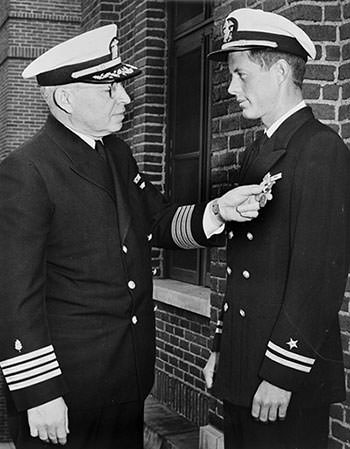
#2 He IS THE YOUNGEST EVER ELECTED PRESIDENT OF THE UNITED STATES
In the 1960 United States presidential election, John F. Kennedy defeated incumbent Vice President Richard Nixon to become the 35th President of the United States. At the age of 43, he was and remains the youngest ever elected U.S. president. However, Theodore Roosevelt is the youngest person to ever become U.S. president. He succeeded to the presidency, at age 42, following the assassination of President McKinley. To date, JFK is the only president to have won a Pulitzer Prize, which he won in 1957 for his volume of short biographies Profiles in Courage. He also remains the only Roman Catholic president.

#3 HE TOOK THE U.S. ECONOMY OUT OF RECESSION THROUGH HIS REFORMS
U.S. was in recession when Kennedy took office. He carried out various measures to boost the economy under his own executive anti-recessionary acceleration program. Among other things, the most significant tax reforms since the New Deal were carried out including a new investment tax credit. GDP which had grown by an average of only 2.2% per annum during his predecessor Eisenhower’s presidency, expanded by an average of 5.5% from early 1961 to late 1963, when Kennedy was assassinated. Also inflation remained steady at around 1%, industrial production rose by 15% and unemployment decreased. This rate of growth continued till 1969 and hasn’t been repeated for such a sustained period yet.
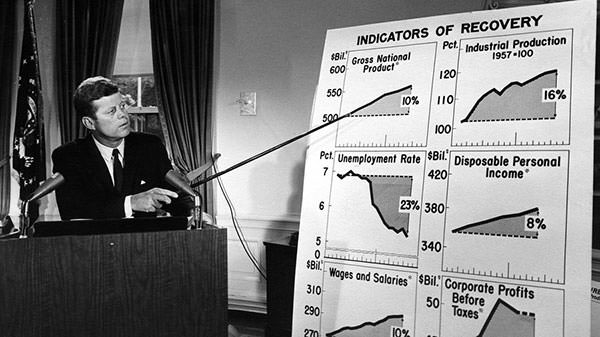
#4 HE ESTABLISHED THE PEACE CORPS IN 1961
President John F. Kennedy established the Peace Corps on March 1, 1961 by Executive Order 10924. It was a program through which American volunteers would help underdeveloped nations in areas such as education, farming, health care, and construction. The organization grew to 5,000 members by March 1963 and 10,000 the following year. Since its formation to 2016, around 220,000 Americans have joined the Peace Corps and served in 140 countries. Its initiatives include eradicating malaria in Africa and responding to crisis like the 1994 Rwandan genocide.
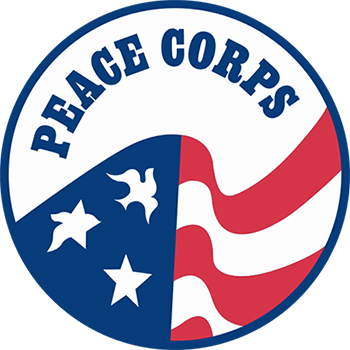
#5 He AVERTED NUCLEAR WAR THROUGH NEGOTIATIONS
The Cuban Missile Crisis started on October 16, 1962 during the presidency of John F. Kennedy. Caused due to placement of nuclear missiles in Cuba by the Soviet Union, it was the closest the Cold War came to escalating into a full scale nuclear war. After a period of tense negotiations started by a message from Soviet leader Nikita Khrushchev to JFK on October 26, the Cuban Missile Crisis came to an end on October 28, 1962. Soviet Union agreed to dismantle its weapons in Cuba and bring them back while the United States agreed that they would not invade Cuba without provocation. Secretly it was agreed that US would remove its nuclear missiles from Turkey but wouldn’t declare so publicly.

#6 HE CONTRIBUTED IN THE FORMATION OF THE PARTIAL NUCLEAR TEST BAN TREATY
To slow down the nuclear arms race and to protect the environment from radioactive contamination, JFK began negotiations with Soviet leader Nikita Khrushchev for a treaty to address these concerns. This resulted in the Partial Nuclear Test Ban Treaty which was signed by the governments of U.S.S.R., U.K. and the U.S. in Moscow on August 5, 1963. The provisions of the treaty prohibited nuclear testing on the ground, in the atmosphere, or underwater. All testing was to be driven underground. 125 UN member states have ratified or acceded to the treaty since then.
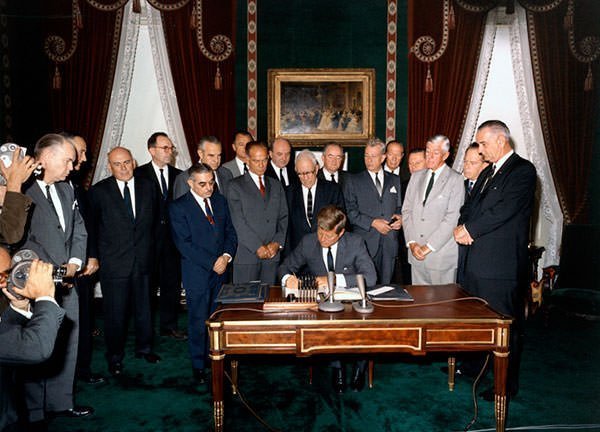
#7 HE INITIATED THE ALLIANCE FOR PROGRESS FOR DEVELOPMENT OF LATIN AMERICA
President Kennedy initiated the Alliance for Progress in 1961 with the aim to establish economic cooperation between U.S. and Latin America. Between 1962 and 1967, the US supplied $1.4 billion per year to Latin America for the development of the region. Growth in regional output per capita in Latin America in the 1960s was 2.6%, exceeding the program’s goal of 2.5%. Adult illiteracy was reduced and there were improvements in housing, financial institutions, tax laws and administration. Alliance for Progress had its deficiencies and failed by the 1970s mainly due to Latin American nations’ unwillingness to implement needed reforms and presidents after Kennedy being less supportive of the program.
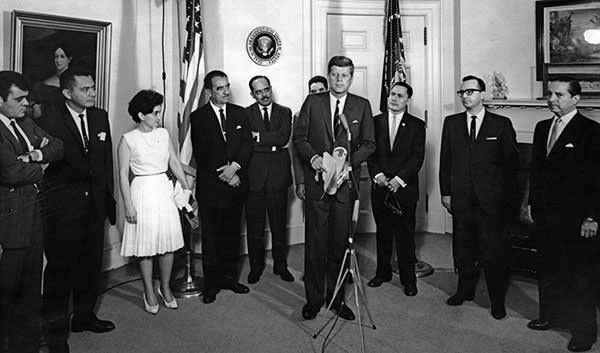
#8 WIDE RANGE OF REFORMS WERE CARRIED OUT DURING HIS TERM
President Kennedy called his domestic program the “New Frontier”. It witnessed the passage of a broad range of important reforms. Among other things, unemployment benefits were expanded; aid was provided to cities to improve housing and transportation; a water pollution control act was passed to protect rivers and streams; significant anti-poverty legislation was passed including increase in social security benefits and minimum wage; and the most comprehensive legislation to assist farmers was carried out since 1938 which included expansion in rural electrification, soil conservation, crop insurance and farm credit.
#9 HE WORKED TOWARDs CIVIL RIGHTS FOR AFRICAN AMERICANS
Kennedy supported racial integration and civil rights through his speeches. On March 6, 1961, he signed Executive Order 10925 which required government contractors to take affirmative action to ensure all employees are treated equally irrespective of their race, creed, color, or national origin. His Executive Order 11063 of November 1962 banned segregation in federally funded housing. On June 11, 1963, JFK gave his famous civil rights address calling Americans to recognize civil rights as a moral cause. His proposal to provide equal access to public schools and other facilities, and greater protection of voting rights became part of the landmark Civil Rights Act of 1964.
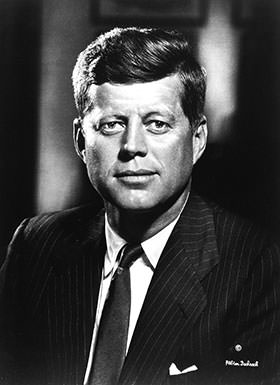
#10 HE WAS RESPONSIBLE FOR THE EQUAL PAY ACT
On 10th June 1963, John F. Kennedy signed into law the Equal Pay Act of 1963 to abolish wage disparity based on sex. It amended the existing Fair Labor Standards Act of 1938. EPA was a major step towards closing the wage gap in women’s pay. Although EPA’s equal pay for equal work goals have not been completely achieved, women’s salaries via-à-vis men’s have risen dramatically since its enactment. JFK also proposed an overhaul of American immigration policy that would later lead to the Immigration and Nationality Act of 1965 that abolished the quota system based on national origins with a preference system that focused on the immigrant’s skills and family relationships with US citizens.
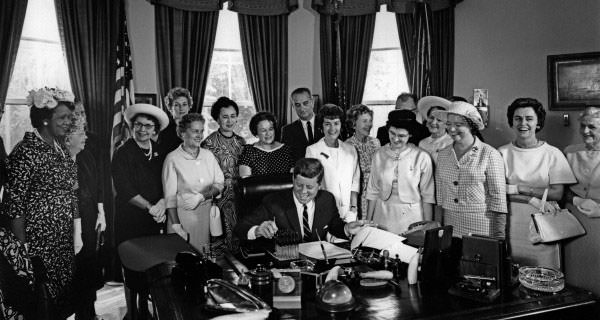
ASSASSINATION OF JFK
John F. Kennedy was assassinated at 12:30 p.m. on 22nd November 1963, in Dealey Plaza, Dallas, Texas while traveling with his wife Jackie Kennedy. The assassin Lee Harvey Oswald denied having committed the crime and was never tried in court as he was fatally shot by a Dallas nightclub owner Jack Ruby. Ruby said he was distraught by JFK’s murder and also wanted to spare Jackie Kennedy the discomfort of a trial. The President’s Commission on the Assassination of President Kennedy concluded that Oswald acted alone in the shooting. However a later committee concluded in 1979 that Kennedy was “probably assassinated as a result of a conspiracy.” Polls have found that only 20 – 30% of the American population believe that Oswald had acted alone. John F. Kennedy remains the last American president to be assassinated.

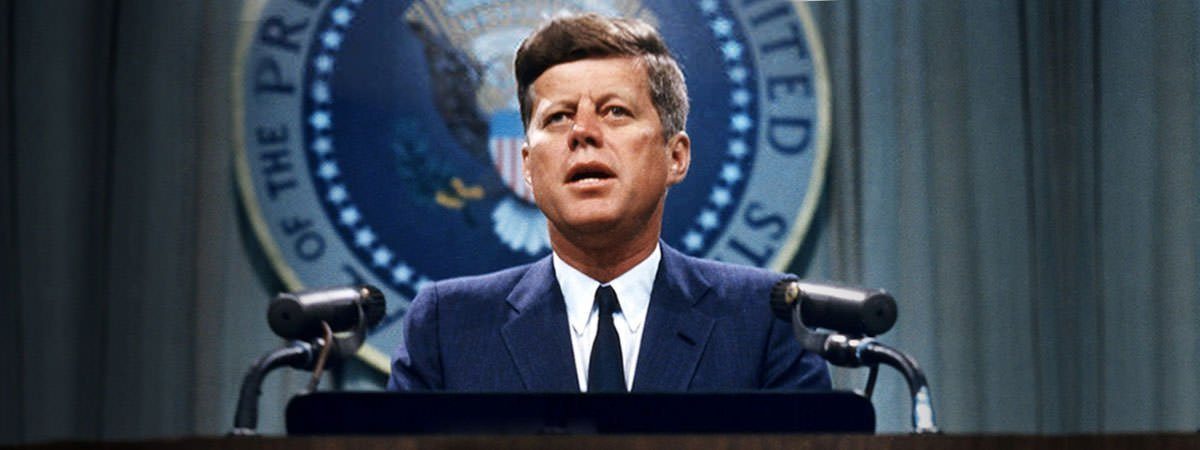
150 pt assignment due tomorrow